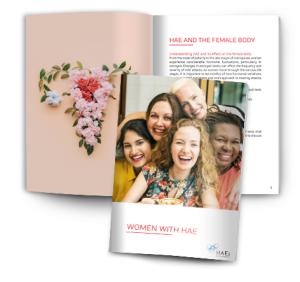In the December 2023 issue of Global Perspectives, we introduced a new, occasional feature called Did You Know? The first topic was All About Women with HAE: Puberty, Pregnancy, and Pediatrics.
Earlier this year, world-renowned HAE expert Professor Henriette Farkas spoke at the 2023 HAEi Regional Conference EMEA about pregnancy and HAE. Prof. Farkas is Honorary President and Director of the Hungarian Angioedema Center at Semmelweis University in Hungary, and we took the opportunity to ask her more.
What do prospective parents with HAE need to know?
Having children is always an important and wonderful event in people’s lives. In all cases, I encourage patients to have children.
Because of the way HAE is inherited, we should inform prospective parents that there is a 50% chance that their offspring will inherit the disease. At the same time, we must reassure parents that the disease is manageable, does not progress, and does not cause organ damage. Their children can live a normal life.
In people with HAE, there seems to be a lot of understandable fears about becoming pregnant. What are the risks, and what can be done to address these fears?
Family planning is a crucial issue. Thinking ahead about conception is recommended. If a woman does want to become pregnant, any androgen treatment should be discontinued because these drugs may cause masculinization of a female fetus. We can advise that the course of HAE may worsen during pregnancy, the postpartum period, and breastfeeding (and it may not). Plasma-derived C1-INH concentrate is the first line treatment during these times.
How can the healthcare professional community best support people with HAE who want children?
We can do this by providing information about possible changes in HAE and stressing the importance of family planning, working out a therapeutic plan, continuous follow-up while working closely with the obstetrician/gynecologist and providing ongoing consultation.
What does the future look like for children born with HAE in the coming years?
The future is bright. We can treat children with HAE with many drugs that are currently available. Several new medicinal products are being developed or evaluated in clinical trials. The introduction of oral medications for acute/ rescue treatment and prevention of HAE attacks, as well as long-acting medications for prophylaxis, will be a significant step forward.
How might genetic advances change the way people with HAE think about the prospect of having children?
The revolutionary progress of molecular genetics provides opportunities to diagnose and treat hereditary disorders like HAE. With this, we have a chance to discover new HAE types, to have a diagnosis during pregnancy (prenatal) or during IVF before the embryo is implanted in the uterus (preimplantation), and to examine young babies born to HAE patients through umbilical cord blood.
Using genetic methods, changing the defective gene to a healthy one, or eliminating a gene that causes disease could mean a long-term therapeutic solution. I do not know of any other rare disease where so many medications with different mechanisms of action and administration routes have been developed. I find this fantastic and really appreciate the work of drug-developing colleagues and companies.
I do not know of any other rare disease where so many medications with different mechanisms of action and administration routes have been developed. I find this fantastic and really appreciate the work of drug-developing colleagues and companies.
 Women with HAE – booklet
Women with HAE – booklet
Medical science is finally beginning to appreciate the unique ways women experience health conditions. Whether it is the way women experience pain differently, through to genetic illnesses like HAE, it is vital to have tailored advice and knowledge for women. For that reason, and with thanks to the US Hereditary Angioedema Association (US HAEA), HAEi is delighted to introduce a brand-new guide called Women With HAE.
The guide focuses on the unique challenges faced by women with HAE, especially as studies indicate that women experience more severe symptoms than men. Women With HAE covers three life stages: childhood, family planning and pregnancy, and menopause and aging.











